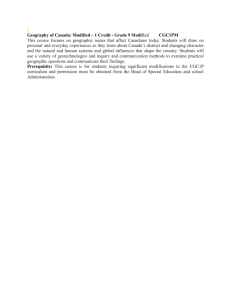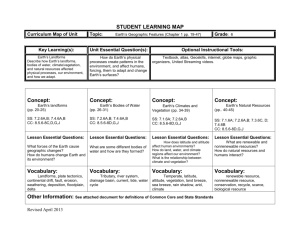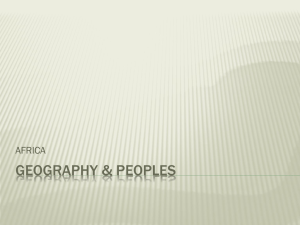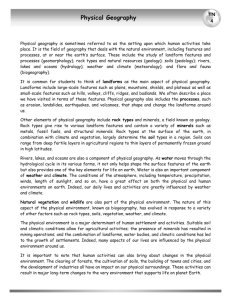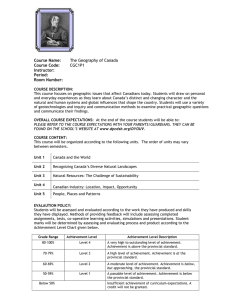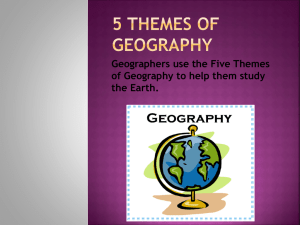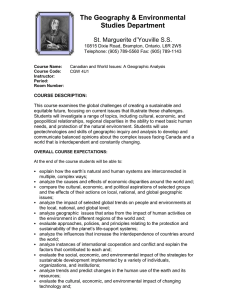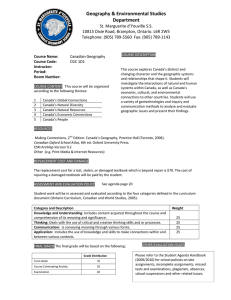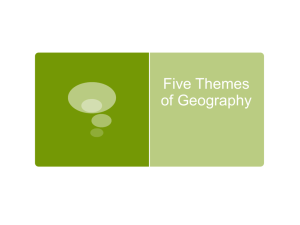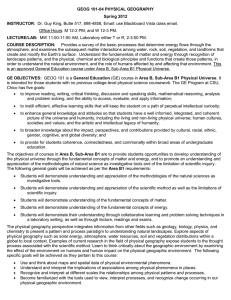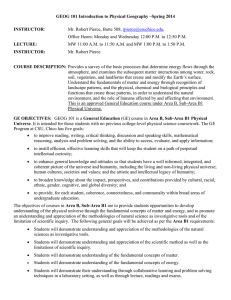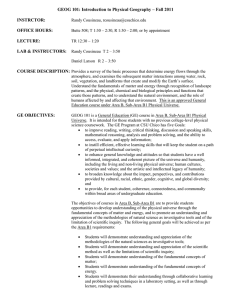Social Science Department St. Marguerite d’Youville S.S.
advertisement
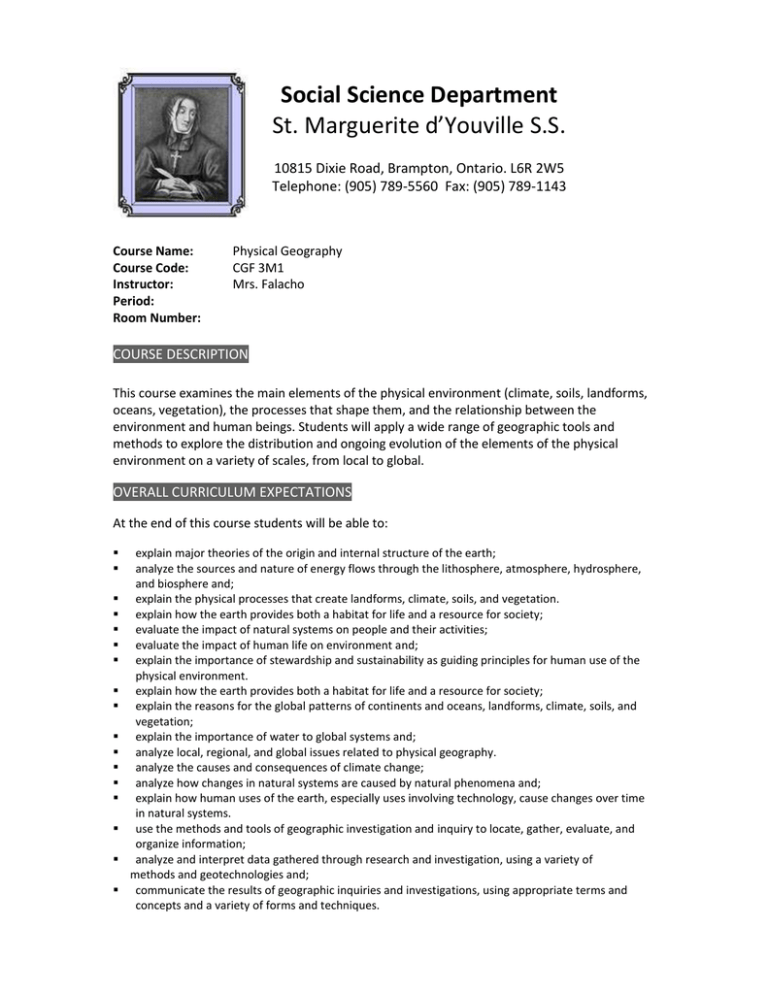
Social Science Department St. Marguerite d’Youville S.S. 10815 Dixie Road, Brampton, Ontario. L6R 2W5 Telephone: (905) 789-5560 Fax: (905) 789-1143 Course Name: Course Code: Instructor: Period: Room Number: Physical Geography CGF 3M1 Mrs. Falacho COURSE DESCRIPTION This course examines the main elements of the physical environment (climate, soils, landforms, oceans, vegetation), the processes that shape them, and the relationship between the environment and human beings. Students will apply a wide range of geographic tools and methods to explore the distribution and ongoing evolution of the elements of the physical environment on a variety of scales, from local to global. OVERALL CURRICULUM EXPECTATIONS At the end of this course students will be able to: explain major theories of the origin and internal structure of the earth; analyze the sources and nature of energy flows through the lithosphere, atmosphere, hydrosphere, and biosphere and; explain the physical processes that create landforms, climate, soils, and vegetation. explain how the earth provides both a habitat for life and a resource for society; evaluate the impact of natural systems on people and their activities; evaluate the impact of human life on environment and; explain the importance of stewardship and sustainability as guiding principles for human use of the physical environment. explain how the earth provides both a habitat for life and a resource for society; explain the reasons for the global patterns of continents and oceans, landforms, climate, soils, and vegetation; explain the importance of water to global systems and; analyze local, regional, and global issues related to physical geography. analyze the causes and consequences of climate change; analyze how changes in natural systems are caused by natural phenomena and; explain how human uses of the earth, especially uses involving technology, cause changes over time in natural systems. use the methods and tools of geographic investigation and inquiry to locate, gather, evaluate, and organize information; analyze and interpret data gathered through research and investigation, using a variety of methods and geotechnologies and; communicate the results of geographic inquiries and investigations, using appropriate terms and concepts and a variety of forms and techniques. COURSE CONTENT This course will be organized according to the following themes: 1 Planetary Systems 2 Structure of the Earth 3 Gradational Process 4 Weather and Climate 5 Independent Study RESOURCES Chasmer, Ron. Earth Matters: Studies in Physical Geography. Oxford University Press, 2001. Canadian Oxford School Atlas, 8th ed. Oxford University Press. Newspaper and Magazines Articles in ‘The Monograph’ (OAGEE) Catholic Board Course Profile (www.curriculum.org) Other (e.g. Print Media & Internet Resources) REPLACEMENT COST AND DAMAGE The replacement cost for a lost, stolen, or damaged textbook which is beyond repair is $75. The cost of repairing a damaged textbook will be paid by the student. ASSESSMENT AND EVALUATION POLICY Students will be assessed and evaluated according to the work they have produced and skills they have displayed. Methods of providing feedback will include assessing works in progress and evaluating completed assignments, tests, co-operative learning activities, simulations, presentations ect. Student marks will be determined by assessing and evaluating according to the achievement level chart given below. Grade Range Achievement Level 80–100% Level 4 A very high to outstanding level of achievement. Achievement is above the provincial standard. 70–79% Level 3 A high level of achievement. Achievement is at the provincial standard. 60–69% Level 2 A moderate level of achievement. Achievement is below, but approaching, the provincial standard. 50–59% Level 1 A passable level of achievement. Achievement is below the provincial standard. Below 50% Achievement Level Description Insufficient achievement of curriculum expectations. A credit will not be granted. Student work will be in assessed and evaluated according to the four categories defined in the curriculum document (Ontario Curriculum, Canadian and World Studies, 2005). Category and Description Weight Knowledge and Understanding: Includes content acquired throughout the course and comprehension of its meaning and significance. 25 Thinking: Deals with the use of critical and creative thinking skills and or processes. 25 Communication: Is conveying meaning through various forms. 25 Application: Includes the use of knowledge and skills to make connections within and between various contexts. 25 FINAL GRADE The final grade in the course will be based on the following: Grade Distribution Term Work 70 Course Culminating Activity or ISU 10 Examination 20 OTHER EVALUATION ISSUES Please refer to the Student Agenda Handbook (2008/2009) for school policies on late assignments, incomplete assignments, missed tests and examinations, plagiarism, absences, school suspensions and other related issues.
